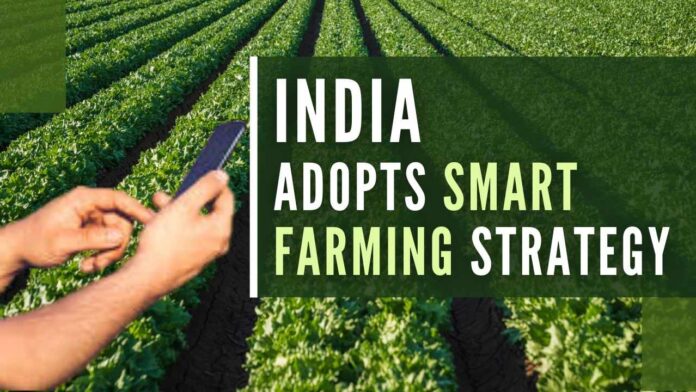
India has more than 450 argi-based tech-driven startups as of 2019
The agricultural sector in India is adopting smart farming methods through technology and innovation which can be a game changer in the days to come by substantially raising farmers’ income. Moreover, smart farming can help integrate digital and physical infrastructures, which would benefit small farmers.
Smart farming involves the application of sensors and automated irrigation practices. It can help monitor agricultural land, temperature, and soil moisture. This would enable farmers to monitor crops from anywhere.
In a unique move, the Indian government is implementing a Digital Agriculture Mission (DAM), which includes India Digital Ecosystem of Agriculture (IDEA), Farmers’ Database, Unified Farmers Service Interface (UFSI), and funding to the states for the new technology (NeGPA), revamping Mahalanobis National Crop Forecast Centre (MNCFC), Soil Health, fertility and profile mapping.
The agriculture sector plays a vital role in enriching India’s economy. Agriculture accounted for almost 17.8 percent of India’s Gross Value Added (GVA) in 2019- 20. According to the World Bank’s collection of development indicators, the employment rate in the Indian agriculture sector stood at 41.5 percent in 2020.
From a socio-economic standpoint, agriculture is a vital sector that requires focus and awareness at all levels.
As the agri-sector witnessed a surge in investments and funding, the number of agri-based tech-driven startups in India has skyrocketed in the last two years. According to a report published by the National Association of Software and Services Companies (NASSCOM) in 2019, there were more than 450 argi-based as of 2019. Agri-based tech-driven startups have been very innovative in assisting farmers and revolutionizing farming techniques. They have also addressed one of the most powerful headwinds (climate change) through climate-smart farming.
Under the NeGPA programme, funding is given to the governments in various Indian states for Digital Agriculture projects using emerging technologies like Artificial Intelligence and Machine Learning (AI/ ML), Internet of Things (IOT), Blockchain, etc. Adoption of drone technologies is being done too. To promote smart farming, the government promotes startups in the agriculture sector and nurtures agri-entrepreneurs.
The ‘Per Drop More Crop’ component of the Pradhan Mantri Krishi Sichai Yojana (PMKSY-PDMC) aims to increase water use efficiency at the farm level through micro irrigation technologies like drip and sprinkler irrigation systems. PMKSY is a scheme initiated by Prime Minister Narendra Modi.
The Indian Council of Agricultural Research (ICAR) promotes innovation, extension, and education in agriculture. A total of 1,575 field crop varieties were released for different agricultural crops during 2014-21. During 2014-21, 91.43 crore agri-advisories were provided to farmers through mobiles. ICAR developed 187 mobile apps for different farm and farmer-related services during 2014-21.
According to India Brand Equity Foundation, the rising population and changing diets have created huge pressure on land in India. Farmers are struggling to keep up as crop yields level off, soil degradation rises, water shortage increases, biodiversity declines, and natural calamities become more frequent. Furthermore, agriculture accounts for almost 14 percent of India’s total greenhouse gas emissions.
In the meantime, the NITI Aayog (erstwhile Planning Commission of India) conducted a study entitled “Efficacy of Minimum Support Prices on farmers”, in 2016, which found, among other things, that MSP declared by the government has encouraged 78 percent of the farmers covered under the study for adopting improved methods of farming such as high yielding varieties of seeds, organic manure, chemical fertilizer, pesticides and improved methods of harvesting, etc.
Additionally, oilseeds, pulses, and copra of Fair Average Quality (FAQ) are procured from registered farmers under the Price Support Scheme of the umbrella scheme of Pradhan Mantri Annadata Aay SanraksHan Abhiyan (PM-AASHA), as per its prescribed guidelines.
The Indian national Budget for 2018-19 had announced the pre-determined principle to keep the Minimum Support Price or MSP at levels of one and half times the cost of production. Accordingly, the government has increased the MSPs for all mandated Kharif (including wheat), Rabi, and other commercial crops with a return of at least 50 percent overall India’s weighted average cost of production from the agricultural year 2018-19.
Moreover, India’s National Crop Insurance Portal (NCIP) is the only source of enrolment for Pradhan Mantri Fasal Bima Yojana (PMFBY), on which farmer applications from various designated sources including banks/ financial institutions are entered. Specific cut-off dates have been prescribed for enrolment of farmers, debit of premium, remittance of farmers’ premium to the concerned insurance company, and uploading of data of farmers on NCIP.
The Ministry of Food Processing Industries (MoFPI) has been incentivizing setting of food processing industries through the central sector umbrella scheme Pradhan Mantri Kisan SAMPADA Yojana (PMKSY), Production Linked Incentive Scheme for Food Processing Industry (PLISFPI), and centrally sponsored scheme PM Formalization of Micro Food Processing Enterprises (PMFME) scheme across all the country.
[With Inputs from IANS]
PGurus is now on Telegram. Click here to join our channel and stay updated with all the latest news and views
For all the latest updates, download PGurus App.
- Reliance Industries becomes first Indian company to cross Rs.1 lakh crore threshold in pre-tax profits - April 23, 2024
- PM Modi extends wishes on Hanuman Janmotsav; shares video highlighting importance of Shri Hanuman - April 23, 2024
- EU announces multiple-entry Schengen visas for Indian nationals with longer validity - April 22, 2024










